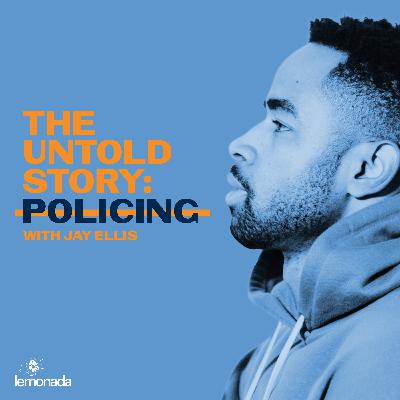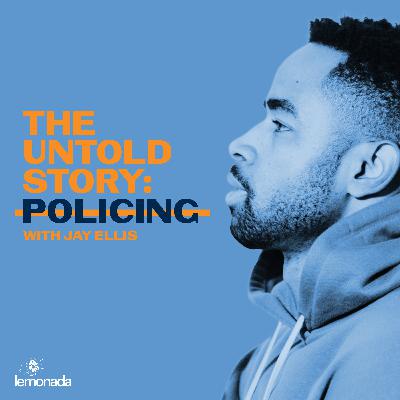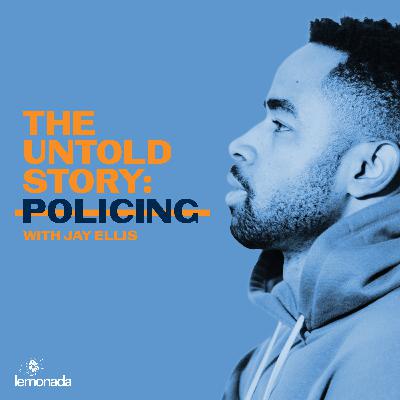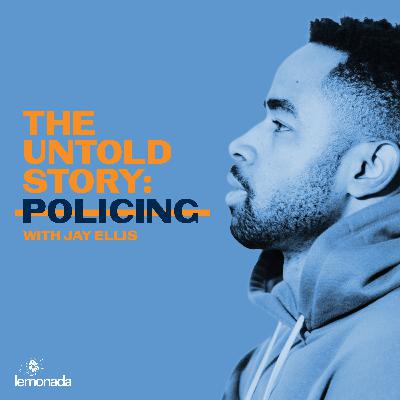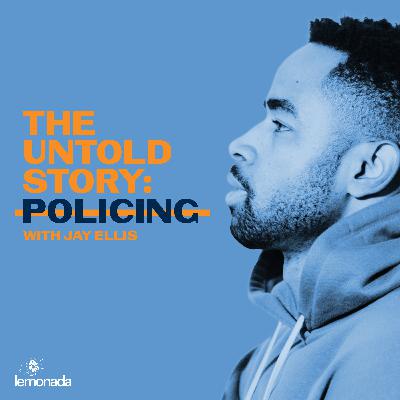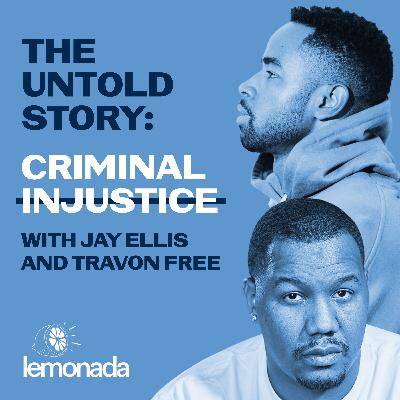Discover The Untold Story: Criminal Injustice
The Untold Story: Criminal Injustice

 The Untold Story: Criminal Injustice
The Untold Story: Criminal Injustice
Author: Lemonada Media
Subscribed: 239Played: 5,914Subscribe
Share
© 2024 Lemonada Media Inc.
Description
On seasons 1 and 2, we took a deep look into policing and criminal justice in America. This season on The Untold Story, we go even further, with three investigations of injustice happening in your own backyard. From executive producer Jay Ellis and Lemonada Media, this season covers how we can fix the humanitarian crisis happening at Rikers Island; why your tax dollars are funding software that leads to over policing in our most vulnerable communities; and the racist roots of the debunked medical term excited delirium. Host Travon Free talks to real people who have experienced the effects first-hand, as well as lawyers, organizers, and city officials who are all part of the effort to answer the question: How can we hold our most powerful institutions accountable?
17 Episodes
Reverse
Join host and actor Jay Ellis (Insecure, Top Gun: Maverick, Mrs. America) as he seeks to explore the untold story of policing. Jay’s mission: demystify police union contracts, separate truth from fiction, and deliver some concrete steps that can end violent police misconduct across the United States.See omnystudio.com/listener for privacy information.See omnystudio.com/listener for privacy information.
Police unions in America are powerful organizations that protect vulnerable, hard working Americans… except when they don’t. Host Jay Ellis shares his personal motivations for untangling the twisted web of public safety in America. Then, Jay calls up Campaign Zero’s DeRay Mckesson and Samuel Sinyangwe to learn more about police unions’ stranglehold on justice and security in America. Learn more at nixthe6.org
Thank you to the Cash App for sponsoring our show. Download the Cash App in the App Store or Google Play store today.
For additional resources, information, and a transcript of this episode, visit https://www.lemonadamedia.com/theuntoldstory See omnystudio.com/listener for privacy information.See omnystudio.com/listener for privacy information.
Fueled with new information about the power of police union contracts, host Jay Ellis is determined to figure out if real change is even possible. So he heads to Austin, Texas where community organizers Sukyi McMahon and Chas Moore changed the course of history...in a city council chamber.
Learn more at nixthe6.org
Thank you to the Cash App for sponsoring our show. Download the Cash App in the App Store or Google Play store today.
For additional resources, information, and a transcript of this episode, visit https://www.lemonadamedia.com/theuntoldstory See omnystudio.com/listener for privacy information.See omnystudio.com/listener for privacy information.
From the 48-Hour Rule to the Law Enforcement Officers’ Bills of Rights, Jay talks with social scientists and legal experts about a criminal justice system that offers special protections to the police that are neither offered to civilians nor backed by hard science.
Learn more at nixthe6.org
Thank you to the Cash App for sponsoring our show. Download the Cash App in the App Store or Google Play store today.
For additional resources, information, and a transcript of this episode, visit https://www.lemonadamedia.com/theuntoldstory See omnystudio.com/listener for privacy information.See omnystudio.com/listener for privacy information.
It’s our solutions episode! Jay arrives at six things that have got to be eliminated in order to usher in substantial improvements to public safety and policing in America and he talks with Netta Elzie (activist, organizer and co-founder of Campaign Zero) about how she transformed her own grief, frustration and anger into steady irrefutable progress. Step one: dive in.
Learn more at nixthe6.org
Thank you to the Cash App for sponsoring our show. Download the Cash App in the App Store or Google Play store today.
For additional resources, information, and a transcript of this episode, visit https://www.lemonadamedia.com/theuntoldstory See omnystudio.com/listener for privacy information.See omnystudio.com/listener for privacy information.
Jay Ellis is back, exploring no-knock raids through the eyes of a family who, unlike Breonna Taylor, survived a terrifying evening of mistaken identity. Joined by experts, Jay explores a system that allows for warrants, raids, and civil-asset forfeiture. Netta and DeRay also join to share a blueprint for how Breonna’s life could have been spared.
Learn more at endallnoknocks.org and nixthe6.org
Thank you to the Cash App for sponsoring our show. Download the Cash App in the App Store or Google Play store today.
For additional resources, information, and a transcript of this episode, visit https://www.lemonadamedia.com/theuntoldstory See omnystudio.com/listener for privacy information.See omnystudio.com/listener for privacy information.
In season one of The Untold Story, host Jay Ellis (Insecure, Top Gun: Maverick, Mrs. America) took us on a journey to understand policing and its pitfalls. Now, he's back to tell you about some of the things that can happen after you get arrested. You might be aware that America's criminal justice system incarcerates more individuals than any other country. But did you know that you can have your life ruined for stealing something as small as a pair of jeans? Or that the forensic evidence used against you may not be based in scientific fact? Or that once you get out of prison, you might be hit with a large bill for your stay? The Untold Story Season 2: Criminal Injustice takes a hard look at the system we've built and asks: Does it need to be this way? And what can we do about it? See omnystudio.com/listener for privacy information.See omnystudio.com/listener for privacy information.
Host Jay Ellis has dealt with shoplifters first-hand, back when he was a teenaged retail manager at a high-end shoe store. But he never learned about the other side of the story - what motivates people to shoplift and what happens to them if they’re caught. In this episode, Jay learns that people can become convicted felons for stealing as little as $200 in value in some states, because of Felony Theft Thresholds written into state law. Jay hears from people who have first-hand, personal experience dealing with the fallout of felony theft convictions. He also speaks to experts who unpack why these policies aren’t helping anyone. Listeners can learn more about felony theft policies in their own states, and find out what they can do to help increase felony theft thresholds at raisethethreshold.org.See omnystudio.com/listener for privacy information.
Host Jay Ellis is a fan of crime scene investigation TV shows - he’s even acted inthem! But in this episode, he learns that all the fancy forensic science the heroesof those shows use to solve crimes are not as good as they seem on TV. Jay speaksto experts about how forensic practices were developed and why they aren’t thereliable science they seem to be. He takes listeners on a field trip to the oneforensic lab in the country that’s getting it right and speaks with a woman whospent 13 years in prison for a crime she didn’t commit because of bad forensicevidence used against her at trial.See omnystudio.com/listener for privacy information.
In all 50 states, people caught up in the criminal justice system can becharged fines and fees for everything from the cost of police transport duringarrests, to the cost of room and board for their time behind bars. In this episode,Jay learns about the back story of how Pay to Stay policy was inspired by a killerclown. And he speaks to experts and journalists about how Pay to Stay policieslock people into a never-ending cycle of debt and involvement with the criminaljustice system.See omnystudio.com/listener for privacy information.
The hit true-crime podcast The Letter is back for Season Two. Today, we’re dropping into your feed to offer you a sneak peek of this gripping and impactful story.
On a winter morning in 1982, two young fathers were found shot to death in a van parked outside an upscale Utah restaurant.The killer soon confessed, but his story about what happened - and why he chose violence - would create more pain, conflict, and questions for the families left in the wake of the murders.
As the families of the men struggle to rebuild their lives, they face questions they never anticipated. Does everyone deserve a second chance? Who is forgiveness for? And if you can inherit trauma, can you also inherit forgiveness? Through their stories, we discover even the most personal decisions can unintentionally ripple through lives, through generations, even impacting the lives of people we’ve never met. From KSL Podcasts (Cold), Lemonada Media (Blind Plea) and WorkHouse Media.
You’re about to hear a clip from Episode 1, Season Two of The Letter. To hear the rest of the episode, head to https://lemonada.lnk.to/theletterfd or theletterpodcast.com.See omnystudio.com/listener for privacy information.
From executive producer, Jay Ellis, and Lemonada Media, season 3 of The Untold Story drops October 25. Host Travon Free talks to real people about the injustices happening in your own backyard.See omnystudio.com/listener for privacy information.
Rikers is a pretrial detention center and while people await their day in court, the conditions at the island are simply inhumane due to violence, overcrowding and inadequate medical care. Rikers is scheduled to close in 2027 but at the rate we're going, eighty more people might die on the island before the jail is shut down. How do we untangle this culture of perpetual violence at Rikers? And could an intervention called a federal receivership make conditions more humane for the people who live there? Host Travon Free uncovers why a receivership might be the only solution that could actually make things better for people right now.
The Untold Story is a Lemonada Media original and is presented by Campaign Zero. This episode is produced by Nicolle Galteland with production help from Hannah Boomershine and Priscilla Alabi. Supervising producer is Kristen Lepore. Production intern is Jala Everett. Fact checking by Steve Crighton. Music, sound design and mixing by Hannis Brown. Engineering from Andrea Kristinsdottir. Executive producers are Jessica Cordova Kramer, Stephanie Wittels Wachs, DeRay Mckesson and Jay Ellis. You can find host Travon Free on Instagram and Twitter: @Travon.
Resources:
The Rikers in Crisis Campaign
The New York Times: Tracking the Deaths in New York City’s Jail System in 2022
The Brennan Center: Receiverships for Jails and Prisons, Explained, The Way Forward for Rikers Island: Receivership
The Fortune Society: At pivotal time for Rikers, experts say federal control is best path forward
The Columbia Justice Lab: Pros and Cons of Receiverships as a Catalyst for Institutional Reform
Vital City: The Fatal Cost of Waiting: What Must Happen Now in the City’s Jails
WNYC/ Gothamist: Correction commissioner absent from oversight hearing as Rikers Island violence escalates
Just leadership USA
The Close Rikers Campaign
The Legal Aid Society
See omnystudio.com/listener for privacy information.
Can you hear the difference between a firework and a gunshot? ShotSpotter says it can. It's a private sector company that uses microphones to detect gunfire and alert police to the scene. The company says it’s a powerful tool to stop gun violence, but critics say it’s an excuse to overpolice some of our most vulnerable communities. How did this technology with questionable accuracy lead to million-dollar contracts with police departments across the country? Travon walks us through the case of Silvon Simmons, a man falsely accused of shooting a cop, all because of an eight-second audio file from ShotSpotter. Plus, conversations with a former 911 operator and a city councilmember in Durham, NC, about the fight against ShotSpotter.
The Untold Story is a Lemonada Media original and is presented by Campaign Zero. This episode is produced by Hannah Boomershine with production help from Nicole Galteland and Priscilla Alabi. Supervising producer is Kristen Lepore. Production intern is Jala Everett. Fact checking by Steve Crighton. Music, sound design and mixing by Hannis Brown. Engineering from Andrea Kristinsdottir. Executive producers are Jessica Cordova Kramer, Stephanie Wittels Wachs, DeRay Mckesson and Jay Ellis. You can find host Travon Free on Instagram and Twitter: @Travon.
Resources:
CancelShotSpotter.com
See omnystudio.com/listener for privacy information.
In this episode, host Travon Free uncovers the racist roots of the debunked medical term “excited delirium.” A study from Maryland in 2017 found that excited delirium was referenced in 11 percent of cases where someone died in police custody. And when these cases go to court, the concept of excited delirium can be used to argue that the police did nothing wrong. How did TASER, a couple of doctors and a handful of so-called experts take a meaningless psychiatric term and get it picked up by police departments, medical professionals and courtrooms all over the country?
The Untold Story is a Lemonada Media original and is presented by Campaign Zero. This episode is produced by Nicolle Galteland with production help from Hannah Boomershine and Priscilla Alabi. Supervising producer is Kristen Lepore. Production intern is Jala Everett. Fact checking by Steve Crighton. Music, sound design and mixing by Hannis Brown. Engineering from Andrea Kristinsdottir. Executive producers are Jessica Cordova Kramer, Stephanie Wittels Wachs, DeRay Mckesson and Jay Ellis. You can find host Travon Free on Instagram and Twitter: @Travon.
Resources:
Campaign Zero @campaignzero on Twitter and Instagram; Sign up to learn more: https://campaignzero.typeform.com/untold-story
Physicians for Human Rights: “Excited Delirium” and Deaths in Police Custody
Richard Burns documentary: Exposed: Last Writes
The American Medical Association: Policy on Excited Delirium
BART Police Department: New policy on excited delirium
Brookings: How “excited delirium” is misused to justify police brutality
Dr. Obasogie in the Virginia Law Review: Excited Delirium and Police Use of Force
Justice for Angelo Quinto
California Attorney General, Rob Bonta
See omnystudio.com/listener for privacy information.
There has been a lot of media coverage around recent spikes in violent crime. A LOT. Even though overall crime rates are at historic lows, many people are feeling unsafe and want solutions. Most people also want to tackle our country’s incarceration crisis while addressing public safety concerns. As it turns out, these things go hand in hand. Join us for this special live event between Lemonada Media and The Just Trust to hear from executive directors of three leading criminal justice reform advocacy organizations – a former Police Lieutenant, a former federal prosecutor, and a social worker focused on drug law reform – about the intersection of safety and criminal justice reform in this moment. We’ll ask questions like “what really makes communities safer?” (hint - it’s not more prisons), and “what myths do we need to bust about justice reform?”
The bottom line is that the criminal justice system impacts all of us, and we all have a role to play in making it better – in every city, in every state, regardless of who is in the White House or the Governors’ mansions. Join us as we break down some of the most urgent strategies for change, and how unlikely allies across sectors are leading the way.
This is a sponsored episode by The Just Trust, a philanthropic venture that is 100% dedicated to powering criminal justice reform, state by state and across the country. Visit TheJustTrust.org to learn more.
Click this link for a list of current sponsors and discount codes for this show and all Lemonada shows go to lemonadamedia.com/sponsors.
Stay up to date with us on Twitter, Facebook, and Instagram at @LemonadaMedia. See omnystudio.com/listener for privacy information.
Incarceration in the U.S. has profound flaws and consequences, but there are many people doing life-changing work to lessen its harm. In this special episode, Lemonada co-founder Stephanie Wittels Wachs sits down with two individuals whose organizations aim to increase access to housing for people who have been involved in the justice system. Stephanie speaks with Leslie Credle, founder and executive director of Justice 4 Housing in Boston, and Bernadette Butler, director of The Homecoming Project, an initiative out of Impact Justice in Northern California. The three discuss the realities faced by justice-involved individuals in today’s society, and how housing is both a human right and a crucial place to start when trying to improve lives.
You can find Justice 4 Housing at justice4housing.org and @justice4housing on Instagram and YouTube. The Homecoming Project can be found through its parent organization at impactjustice.org and @impactjustice on Instagram and Facebook.
Thank you to both of these organizations for making this episode possible.See omnystudio.com/listener for privacy information.


